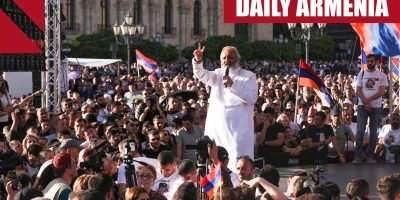By Liz Fuller
Two months ago, Georgia’s leaders professed themselves supremely confident that the nominally independent candidate the ruling Georgian Dream-Democratic Georgia party had chosen to support would win a convincing victory in the 28 October presidential election. In the event, French-born former Foreign Minister Salome Zourabichvili finished less than 1 percent ahead of her closest challenger, Grigol Vashadze of the former ruling United National Movement (ENM) that Georgian Dream defeated in the October 2012 parliamentary election.
According to the Central Election Commission, Zourabichvili polled just 38.64 percent of the vote, compared with 37.74 percent for Vashadze. https://civil.ge/archives/262328 Vashadze polled more votes than Zourabichvili in the cities of Kutaisi, Rustavi, Poti and Batumi, while the two were neck and neck in Tbilisi. An exit poll conducted by the opposition European Georgia party (whose candidate Davit Bakradze placed third) and a parallel vote tabulation by the International Society for Free Elections and Democracy (ISFED) https://civil.ge/archives/262208 placed Vashadze 3 and 1 percent ahead respectively, with 37 and 38.5 percent of the vote compared with 34 and 37.6 percent for Zourabichvili.
The news portal InterPressNews quoted Kristian Vigenin, the leader of the OSCE/ODIHR Election Observation Mission, as saying on 29 October that the violations registered in the course of the voting and vote count were not of such magnitude as to call into question the official results.
It is a measure of the disarray and consternation within GD’s ranks that the date for the second-round run-off has still not been formally confirmed. Meanwhile, leading party members are sending mixed signals, and the country’s currency fell on 7 November to an all-time low against the U.S. dollar.
Analysts both domestic and foreign attributed the outcome of the ballot primarily to GD’s policy failures and flawed decisions over the past six years. The party has failed to deliver on its promises of a strong economic upswing and reduction in unemployment. Its founder Ivanishvili, who emerged from self-imposed obscurity in May to take over the party chairmanship from then Prime Minister Giorgi Kvirikashvili, is perceived as dictating government policy single-handed, even though he holds no formal government office.
The Interior Ministry and Prosecutor General’s office are suspected of perverting the course of justice by protecting persons implicated in the murder by their peers in December 2017 of two Tbilisi high-school students. Finally, Ivanishvili personally opted to back Zourabichvili’s presidential candidacy despite the reservations of many veteran GD members and the furore occasioned by her statement that Georgia bears responsibility for the outbreak of the August 2008 war insofar as its leaders allowed themselves to be baited and provoked by Russia.
A close comparison of the voting figures corroborates that, as publicist Zaal Andronikashvili explained, a large number of voters sought to convey their rejection of one candidate (Zourabichvili) and/or of the party that backed her.
That is borne out by a comparison between voting patterns in the 2018 presidential election and the parliamentary ballot two years earlier, in which voter turnout was 46.74 percent and 51.6 percent respectively. In October 2012, GD polled 856,638 votes and the ENM 477,053. This time around, Zourabichvili garnered 615,624 votes, which is tantamount to 28 percent fewer than were cast for GD in the parliamentary election, while the ENM’s Vashadze received 601,188 votes, 26 percent more than his party received in 2016.
Senior GD parliamentarian Roman Kakulia described the election results as “a badly-needed slap in the face,” given that “corruption surfaced, human rights were violated, mistakes were made, we could not provide society with what we promised and we couldn’t explain why we were unable to do so.”
Other GD members too concede that the party had made errors of judgment, but there still seems to be no clear consensus within its ranks about how to pull its chestnuts out of the fire. Leading parliamentarian Eka Beselia and Tbilisi mayor Kakha Kaladze have acknowledged that unspecified “changes” are needed fast, but it is unclear what form they might take.
In some cases, the statements emanating from the party are contradictory. Senior GD parliamentarian Mamuka Mdinaradze said on 30 October that personnel changes within the party are planned, but not at ministerial level.
One week later, parliament speaker Irakli Kobakhidze categorically ruled out any “fundamental” personnel changes “at present,” while deputy parliament speaker Gia Volsky said there would be changes in the composition of the government should that prove necessary. At the same time, Volskydismissed rumors that Mamuka Bakhtadze is to be replaced as prime minister.
Other members of GD, however, implied that the planned changes will affect first and foremost the structure of and communication within the party hierarchy. Kaladze, who is also GD general secretary, argued that “management and communication within the political team need to be strengthened; decisions have to be made quickly and more effectively, and be oriented towards results and people’s needs.”
Pleading that GD should be given the chance to identify and rectify its past mistakes, former senior diplomat Tedo Japaridze similarly declared that “we need to fix cadre policy, how the party is governed, and the power vertical.”
As for Ivanishvili, his only public comment to date took the form of a rambling televised address on 5 November in which he too acknowledged that voters were angry and disappointed that Georgian Dream had failed to deliver on its promises. Ivanishvili took personal responsibility for that failure; singled out poverty as the most pressing issue the government faces; and undertook to “redress within one year all errors of governance and use all resources available to me to ensure that the development of the country becomes irreversible.” His only concrete pledge, however, was to raise by an unspecified amount pensions and the allowances paid to internally displaced persons.
Political commentators Gia Khukhashvili, Gia Nodia, and Nika Chitadze have all expressed doubt https://www.kavkaz-uzel.eu/articles/327701/ that such abstract statements of good intention at this late stage are enough to win back those former GD voters who either stayed at home or voted for another candidate.
Ivanishvili further warned that Georgia is again at “a historic crossroads,” facing an opponent that “is not a political party” but “the forces of violence poised for revenge” which, he continued, resort to shameless lies and utopian promise in their single-minded intention of destroying “all the values we hold dear.” In that context, he appealed specifically to “Georgian Dream’s Old Guard” to set aside their “heartache and discontent,” given that the country “again needs their dedication, experience, and civic heroism.”
Two other senior GD members, law-maker Gedevan Popkhadze and parliament Defense and Security Committee chair Irakli Sesiashvili have issued alarmist warnings that a Vashadze win in the run-off could trigger civil war.
Meanwhile, the ENM is out to exploit to the maximum GD’s current weakness and vulnerability. Vashadze declared on 5 November that his immediate priority in the event he is elected president will be pre-term parliamentary elections. It is unclear, however, how he could legally force such a ballot given GD’s constitutional majority and the extent that the presidential powers have been curtailed.
Following a meeting in Helsinki between ENM head and former President Mikheil Saakashvili and former Tbilisi mayor Gigi Ugulava, who is one of the leaders of the European Georgia party that broke away from the ENM in the wake of the October 2016 presidential election, Saakashvili announced that the two parties would work together to “save the country” from their “common enemy.”
The prospect of renewed cooperation with the ENM is, however, anathema to some European Georgia members, who promptly quit the party in protest.
Regardless of the outcome of the run-off, GD’s unconvincing efforts to downplay its failures and rally popular support cannot conceal the fact that a large number of voters have concluded that “the oligarch has no clothes.” In that respect, the election may well presage the beginning of the end of what Independent Experts’ Club President Soso Tsiskarishvili has dubbed Bidzinocracy.
















